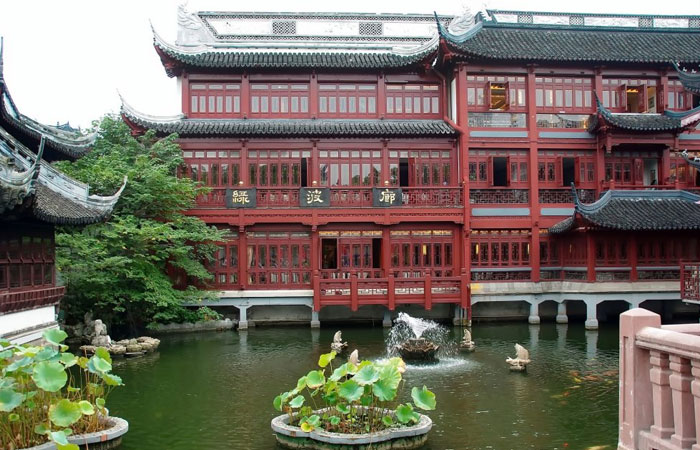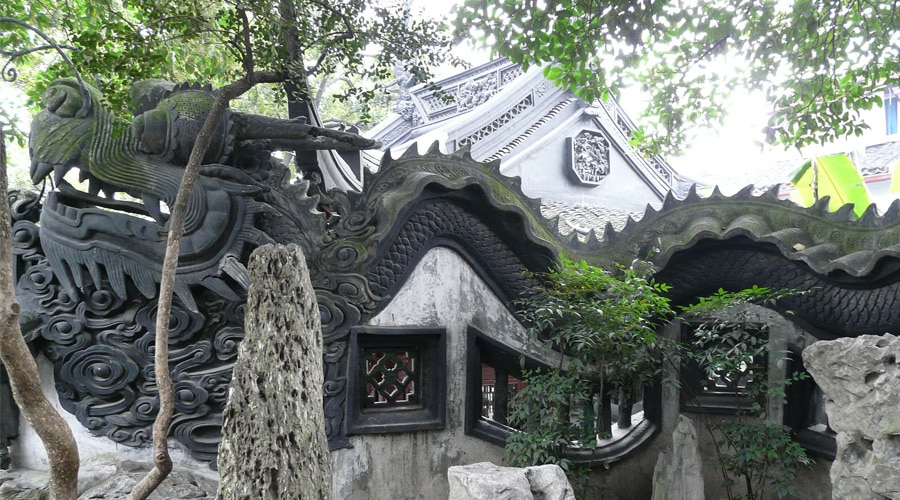Yu Garden, also known as the Yuyuan Garden, is a stunning Chinese botanical garden located near the City God Temple in Shanghai. It displays the main features of traditional Chinese architecture with many rocks, trees, ponds, dragons, and zigzag bridges. (Video Credit: Tourist Must See)
Yu Garden Tourist Guide
Directions & Opening Hours
| How to get to | |
|---|---|
| By Metro | Take bus lines 11, 26, 64, 304, 736, 801, 920, 926, or 930 and get off at Xinbeimen station (Renmin Street/Lishui Street). Otherwise, you can take the tourist bus and join directly to Yuyuan Garden. |
| By Bus | Take bus lines 11, 26, 64, 304, 736, 801, 920, 926, or 930 and get off at Xinbeimen station (Renmin Street/Lishui Street). Otherwise, you can take the tourist bus and go directly to Yuyuan Garden. |
| Opening Hours | |
| Open | 8: 30 – 17:30 (there is no ticket available after 17:00) |
| Close | To reach the Yu Garden by metro, take subway line 10 and get off at Yuyuan station. Then leave the station by exit 1. |
Entry Ticket Fees
| Person Type | Ticket Price |
|---|---|
| Adults (18-60 years old) | CNY 30 (around USD 4.25) |
| Children under 6 years old or under 130cm in height | Free entry |
| Children (3-11 years old or 100cm-140cm in height) | CNY 15 (around USD 2.10) |
| Seniors (over 60 years old) | CNY 15 (around USD 2.10) with valid ID |
History of Yu Garden
Constructed between 1559 and 1578, the garden was built during the Ming Dynasty more than 400 years ago. Did you know that this peaceful and serene place was the scene of clashes and political struggles during the 19th century?

At the heart of the fighting, the garden was ravaged several times. City God Temple was bombed during the Opium War in 1842 and occupied by the British army for a few days. Besides, the French army destroyed the Garden during the retaliatory operation at the end of the 19th century in the Taiping Rebellion. It was in 1956 that the reconstruction of the Garden was started and it lasted 20 years. Yu Garden was reopened to the public in 1961.
Yu Garden Function
Yu Garden aims to represent the world in miniature with its rivers, mountains, and villages. There are no geometric shapes and everything is round symbolizing the sky. The small hills, ingeniously mingling pavilions, and corridors as well as the well-placed rocks, lotus ponds, bridges, winding paths, and trees have made a stunning atmosphere in the garden. Here, there are also several pavilions in which, you can find a dragon statue as a symbol of imperial power.
Best Time to Visit
To avoid crowds, think about visiting the Yu Garden early in the morning and during the week as the weekends are very busy. The best season is the spring or in August when all the flowers offer their open petals and diffuse an intoxicating scent. At the time of visiting the City God Temple, don’t forget to visit the Yu Garden as well and share your ideas and thoughts with us. Besides, our professional guides will reply to your questions about this attraction as soon as possible, so you can leave them in the comment section.
Tips for navigating crowds
- Purchase your tickets online in advance: This will save you time waiting in line at the ticket booth.
- Go early or late: The garden is busiest around midday.
- Follow the designated route: This will help you avoid getting lost in the maze-like layout.
- Be patient: The garden can be crowded, so just relax and enjoy the experience.
Tips for getting the best experience
- Hire a guide: A guide can help you learn about the history and culture of the garden.
- Take your time: Don’t rush through the garden. Take your time to admire the details and soak in the atmosphere.
- Go off the beaten path: There are many hidden gems in the garden that most visitors miss.
- Visit the Yuyuan Bazaar: The bazaar is a great place to find souvenirs and try some local food.
Inside the Yu Garden
The garden covers a large space and houses some halls, buildings, and cultural relics including old-century furniture, calligraphy, precious paintings of famous artists, clay & brick sculptures, and inscriptions.
Today, Yu Garden occupies an area of 2 hectares (5 acres) divided into six general spaces furnished in the Suzhou style:
Sansui Hall
Sansui Hall, translated literally as the Three Tassel Hall, includes the Grand Rockery, which is a 12-meter-high rockery made of Huangshi stone, featuring peaks, cliffs, winding caves, and gorges. This scenery was possibly created during the Ming Dynasty.
Wanhua Chamber
Wanhua Chamber is the “tower of a hundred thousand flowers”. Here, you can see a great combination of flowers such as street bamboo, cloisters, etc. Near the Wanhua Chamber, you can see two old trees and one of them is a 400-year-old ginkgo.
Dianchun Hall
Constructed in 1820 (the first year of the Daoguang Emperor), Dianchun Hall used to serve as the base of the Small Swords Society from September 1853 to February 1855
Huijing Hall
Huijing Hall is a corridor with a zigzag bridge and a central pavilion.
Yuhua Hall
Yuhua Hall, literally translated as the “Jade Magnificence Hall”, is furnished with rosewood pieces from the Ming Dynasty.
Inner Garden
Inner Garden includes rockeries, pavilions, ponds, and towers. It was first laid out in 1709 and more recently recreated in 1956 by merging the east and west gardens.
Walls Of the Dragons
“Walls of the dragons” includes rippling gray curved ridges and each of them is terminated by a dragon’s head separating the spaces of the gardens.
Yuyuan Bazaar
Do not miss the Bazaar, which is ideal to buy some souvenirs located next to the garden. It helps you to immerse yourself in the traditional atmosphere.
Architectural Features of Yu Garden
Yu Garden, also known as Yuyuan Garden, is a splendid example of traditional Chinese garden design that dates back to the Ming Dynasty. It is located in the northeastern part of the old city of Shanghai and encapsulates the sophisticated philosophy of Chinese garden layout. The garden’s design is intricate, harmonizing the natural landscape with man-made structures to create a serene and picturesque environment that is both aesthetically pleasing and symbolically rich.
One of the most notable architectural features of Yu Garden is the use of space. The garden is divided into six general areas, each with its unique character and scenery, comprising pavilions, ponds, rockeries, and cloisters. This segmentation creates the illusion of a larger space while ensuring that every view is meticulously framed and balanced.
The Heralding Spring Hall (Dianchun Hall) is one of the key structures in Yu Garden. It was once the headquarters of the Xiaodao Hui, a resistance group fighting against the Qing Dynasty. This hall symbolizes the spirit of resilience and unity among the Chinese people during times of adversity.
Rockeries, or artificial mountain peaks, are another prominent feature of Yu Garden. The Great Rockery, standing at over 14 meters high, is the largest in the region. These structures are not just visually impressive; they are also symbolic of the Taoist pursuit of longevity and immortality. The rockeries are meticulously designed to represent natural landscapes in miniature, including caverns, cliffs, and crevices.
The Jade Water Corridor is a covered walkway that meanders around the sections of the garden, providing a tranquil path for visitors to enjoy the scenery. This architectural element exemplifies the Chinese belief in the harmonious coexistence of humanity and nature. The corridor’s placement near water features such as ponds and streams also emphasizes the importance of water in Chinese gardens, symbolizing life and renewal.
Pavilions and pagodas are scattered throughout Yu Garden, each serving a specific purpose, such as contemplation or social gatherings. The Pavilion of Listening to Billows (Ting Tao Pavilion) allows visitors to sit and listen to the sound of the wind through the bamboo, a sensory experience cherished in Chinese culture.
Lastly, the Zigzag Bridges, known for their unique shape, serve the practical purpose of preventing evil spirits from crossing them, as they are believed to only travel in straight lines. These bridges also enhance the contemplative experience of the garden by slowing down visitors’ pace, encouraging them to take in the scenery from multiple angles.































